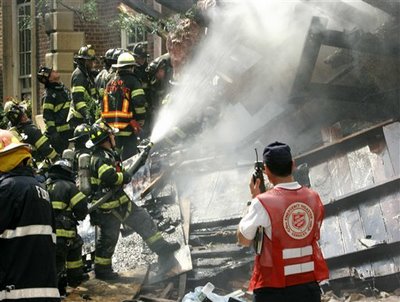
A few months ago, Maggie Gallagher wrote perhaps the most astoundingly obscene opinion piece I've ever read; to my mind, it was as vicious and ugly and insane as the worst of Coulter or Malkin. Her subsequent pathological outbursts have been tame by comparison, so I've pretty much ignored them.
However, her current defense of the would-be suicide Dr. Nicholas Bartha is worth noting because it underscores her basic belief that behind almost every violently deranged man, there's a woman.
As most people know, Dr. Bartha blew up a house in the middle of an NYC block, an act that most people would say demonstrates a certain lack of concern for public safety. At the very least, it would seem to be a violation of the Hippocratic Oath...a vow that probably ought to be at least as serious a commitment as one's marriage vows.
But Gallagher can't quite see it that way:
Nicholas Bartha, 66, was by all accounts a good and caring doctor, a cardiologist affiliated with both Lenox Hill Hospital on the Upper East Side and Mount Vernon hospital in Westchester County.Nobody's perfect, of course, and Gallagher goes on to report - with admirable restraint - that Bartha was "impossible to live with":
"Defendant intentionally traumatized his wife, a woman of Jewish origin born in Nazi-occupied Holland, with swastika-adorned articles and notes affixed around their home, and became enraged when she removed them."That does indeed sound like a pretty uncomfortable living situation. It almost makes one doubt Gallagher's assertion that "divorce, not terrorism, caused this explosion." To say nothing of her claim that Bartha's suicide was, in its own special way, "good and caring":
The saving grace, the thing that makes you preserve a tiny piece of sympathy for the man, is that as he descended into his own black pit of rage, he turned suicidal, not homicidal.Perhaps I'm a pedantic literalist, but again, blowing up a building seems to me to be at least potentially homicidal. No one could've been surprised if neighbors or passersby had been killed (instead of "merely" injured). Gallagher herself notes Bartha's antipathy to his neighbors, and even points out that "New York City firefighters risked their lives to save him."
And of course, this was much more than a suicide. Bartha's attempt to reduce his wife to poverty - to turn her "from gold digger to ash and rubbish digger," as he put it - is an act of violence that fits in perfectly with his history of abuse.
But as the old Irish proverb says, "They talk of my drinking, but never of my thirst":
[T]here is another thing that makes me pause to offer a moment of human sympathy amid the evil this man did. My grandfather did exactly the same thing: At 67, upon learning that his wife of 30 years was leaving him, he burned down his own house, and died of the self-inflicted flames. We were not close. I hardly knew him. He, like Bartha, first destroyed his marriage by descending into paranoid rage, and then destroyed himself rather than face old age, alone, unloved, disconnected, publicly pronounced a failure as a man by his own wife.Once again, Gallagher displays a sociopathically indulgent view of (male) personal responsibility, and a bizarre identification with male violence; it was the wife's act of divorce that "publicly pronounced" these brutal, abusive men as failures, thereby ennobling or excusing - to whatever implicit extent - their final, pathetic act of cruelty.
Gallagher never needs any other reason than misogyny to explain away male violence, but in this case, she has a very good one: Bartha padded out his suicide note interminably with hard-right talking points clearly gleaned from columnists and commentators just like her. Little wonder, then, that she completely ignores his political views in order to commiserate with the "rage" he felt after being divorced by the wife he brutally abused.
Personally, I wonder if it's at all possible that misogynist demagogues like Gallagher - and the media outlets that promote them - might bear even more responsibility for Bartha's "demented plot" than feminism, or our culture's tolerance of divorce.
UPDATE: Amanda has lots more.
1 comment:
Gentlewoman,
Well said. Makes me feels silly for squandering so many words on this prick.
Post a Comment